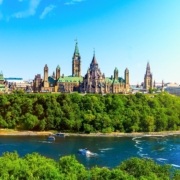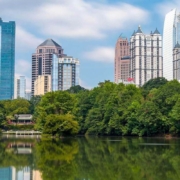Profitability of Airbnb in Toronto: 5 Key Insights to Be Aware Of
Best Airbnb Cities in Ontario: List of the Most Profitable Airbnb Locations in Ontario
Introduction to Airbnb in Toronto
Airbnb has revolutionized the travel industry by offering a unique and personalized alternative to traditional hotels. Founded in 2008, the platform has grown exponentially, connecting millions of travelers with hosts worldwide. In Toronto, Airbnb has gained significant traction thanks to the city’s rich culture, diverse population, and status as an international business hub.
Toronto, the capital city of Ontario, is the most populous city in Canada, with over 2.9 million residents. Known for its iconic CN Tower, picturesque waterfront, and bustling arts scene, Toronto attracts over 27 million tourists annually. This influx of visitors creates a high demand for short-term rentals, making the city an appealing market for Airbnb hosts.
The city boasts a diverse range of neighborhoods, each with its unique charm and character. From the hip and trendy Queen West to the vibrant and multicultural Kensington Market, there is something for everyone. This diversity is reflected in the variety of Airbnb properties available, ranging from cozy studio apartments to luxurious penthouses.
As per AirDNA, there are approximately 13,696 active Airbnb rentals in Toronto now. The average nightly rate for an Airbnb rental in Toronto is around $218, with peak season rates reaching as high as $261. These figures demonstrate the potential profitability of Airbnb in Toronto, provided hosts can successfully navigate the market and adhere to local regulations.
In this article, we explore the factors affecting profitability and share five key insights to help you make informed decisions.
The Growth of Airbnb in Toronto
Airbnb has indeed experienced substantial growth in Toronto in recent years. According to Inside Airbnb the number of active listings in Toronto increased from around 10,000 in 2016 to approximately 19,000 in 2023. This growth can be attributed to various factors, including the city’s booming tourism industry and a growing preference for alternative accommodation options.
In 2019, Toronto saw a record-breaking 28.1 million visitors, which generated over $10.3 billion in economic impact. This thriving tourism industry has significantly contributed to the demand for short-term rentals in the city. With the easing of travel restrictions post-pandemic, these numbers are expected to rebound, further fueling the growth of Airbnb in Toronto.
Another factor contributing to the growth of Airbnb in Toronto is the increasing popularity of home-sharing platforms among travelers. A 2018 study by Statista found that the global usage of home-sharing services, including Airbnb, increased from 17% in 2015 to 25% in 2018. This trend suggests a shift in traveler preferences, with more people opting for personalized, local experiences over traditional hotel stays.
The lucrative nature of Toronto’s Airbnb market is also evidenced by its ranking among North American cities. In 2019, a report by AirDNA, an Airbnb data analytics firm, revealed that Toronto ranked 6th among the top 10 most lucrative Airbnb markets in North America. This ranking highlights the potential profitability for hosts in the city, given the right strategies and adherence to local regulations.
Factors Affecting Profitability
To better understand the profitability of Airbnb in Toronto, it’s essential to examine the factors that can impact your earnings. Some of the key factors include:
- Location
- Property Type and Amenities
- Pricing Strategy
- Occupancy Rates
- Regulations and Taxes
Effective Airbnb Marketing Strategy: Stand Out and Succeed
5 Key Insights for Profitability
Read about Mastering the Art of Maximizing Your Airbnb Earnings.
To maximize your Airbnb profits in Toronto, consider the following insights:
Insight 1: Prime Locations Generate Higher Profits

Choosing a prime location for your Airbnb property can significantly impact your earnings. In Toronto, certain neighborhoods are known to generate higher profits due to their popularity among tourists and business travelers.
For instance, according to data from AirDNA, the average daily rate (ADR) for Airbnb listings in Downtown Toronto was around $150 in 2021, whereas listings in more residential neighborhoods like North York fetched an ADR of approximately $100. This difference in rates can be attributed to the higher demand for properties in centrally located areas, where guests have easy access to tourist attractions, restaurants, shopping centers, and public transportation.
Another example is the Entertainment District, home to major attractions such as the CN Tower, Ripley’s Aquarium, and Scotiabank Arena. According to a 2019 report by AirDNA, the Entertainment District had an occupancy rate of 72% and an ADR of $164, making it one of the most profitable areas for Airbnb hosts in Toronto.
Similarly, areas like Yorkville and King West are known for their upscale shops, trendy restaurants, and vibrant nightlife, making them attractive to tourists and business travelers alike. As a result, Airbnb properties in these neighborhoods can command higher nightly rates, contributing to increased profitability for hosts.
In contrast, listings in less popular or more remote neighborhoods tend to have lower occupancy rates and ADRs. For example, Airbnb listings in Scarborough, a more suburban area in eastern Toronto, had an average occupancy rate of 58% and an ADR of $90 in 2019, according to AirDNA.
Read more here:
- Top Toronto Neighbourhoods for Airbnb
- An In-depth Look at 5 Toronto Neighborhoods for Airbnb: Waterfront Communities & The Island, Bay Street Corridor, Yorkville, Annex, Palmerston-Little Italy
Insight 2: Unique and Well-Designed Properties Attract Guests
Guests are more likely to book a property with appealing design and amenities. Investing in unique features, such as a rooftop patio or a well-equipped kitchen, can set your listing apart and attract more bookings. Additionally, well-maintained and clean properties tend to receive better reviews, leading to more reservations and higher profits.
Airbnb Essentials: Full Checklist of Supplies for Airbnb Hosts
Insight 3: Dynamic Pricing Maximizes Revenue
Setting the right price for your Airbnb is essential to maximize revenue. Adopt a dynamic pricing strategy that takes into account factors like seasonality, local events, and competitor pricing. Use pricing tools or consult with experts to ensure your rates remain competitive without sacrificing profitability.
Airbnb Pricing: The Best Guide to Airbnb Pricing Strategy
Insight 4: High Occupancy Rates Increase Profitability
Maintaining a high occupancy rate is essential for maximizing your profits. Focus on providing excellent customer service, responding promptly to inquiries, and addressing any issues that arise during a guest’s stay. Additionally, implement marketing strategies, such as professional photography, engaging listing descriptions, and social media promotion, to attract potential guests.
Insight 5: Staying Compliant with Regulations Protects Profits

In Toronto, Airbnb hosts must abide by specific rules and regulations to ensure the safety of guests and maintain harmony within the community. Staying compliant with these regulations is essential for protecting your profits and avoiding fines or penalties.
Here are some of the key regulatory requirements for short-term rentals in Toronto:
Obtaining a short-term rental registration: In order to legally operate an Airbnb in Toronto, hosts must register their property with the city. The registration process requires hosts to provide personal information, the property’s address, and proof of residency. A registration number will be issued upon approval, which must be displayed on the Airbnb listing.
Principal residence rule: In Toronto, short-term rentals are only allowed in a host’s principal residence, meaning the property where they live for the majority of the year. This rule is aimed at preventing the conversion of housing units into full-time vacation rentals and maintaining the availability of long-term rental properties for residents.
Maximum number of nights: Hosts in Toronto are allowed to rent out their entire home for a maximum of 180 nights per year. However, there is no limit on the number of nights for renting a private room or shared space within the principal residence.
Paying the Municipal Accommodation Tax (MAT): Airbnb hosts in Toronto are required to collect and remit a 4% MAT on the cost of accommodations. This tax helps support tourism promotion and development in the city. Airbnb automatically collects and remits this tax on behalf of hosts for bookings made on the platform.
Safety requirements: Hosts must adhere to safety requirements, such as installing smoke alarms, carbon monoxide detectors, and fire extinguishers in their properties. Additionally, they must provide guests with a safety information card that includes emergency contact information and the property’s address.
Useful link: Toronto – Airbnb Help Center
By staying compliant with Toronto’s regulations governing short-term rentals, you can protect your profits, avoid fines or penalties, and maintain a positive reputation as an Airbnb host. It is essential to stay informed about any changes in local regulations and seek professional advice if needed to ensure continued compliance and long-term profitability.
Airbnb Regulations in Toronto 2023
Conclusion
The profitability of Airbnb in Toronto depends on various factors, including location, property type, pricing strategy, occupancy rates, and compliance with regulations. By understanding these factors and implementing the insights shared in this article, you can maximize your earnings as an Airbnb host in Toronto. As the city continues to thrive, now is the perfect time to invest in this growing market.
Explore Key Dates to Know While Managing an Airbnb in Toronto.












